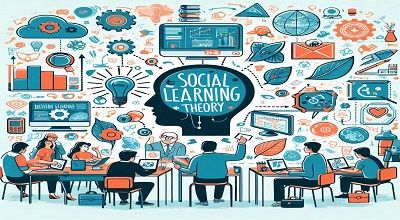Social Learning Theory
Social Learning Theory, developed by Albert Bandura, is a psychological theory that emphasizes the importance of observational learning, imitation, and modeling in the development of behavior. Bandura’s theory builds on the traditional behavioral theories of classical and operant conditioning but incorporates cognitive processes and the role of social factors in shaping human behavior.
Here are the key concepts of Social Learning Theores:
- Observational Learning: People can learn new behaviors by observing others. This process involves paying attention to the model, remembering the observed behavior, and reproducing it when the situation allows.
- Modeling: Individuals learn by imitating or modeling the behavior of others. The behavior of a model can be reinforced or punished, influencing the likelihood that an observer will adopt similar behaviors.
- Reinforcement and Punishment: Social Learning Theory recognizes the importance of reinforcement and punishment in the learning process. Reinforcement increases the likelihood that a behavior will be repeated, while punishment decreases that likelihood. However, in the social learning model, reinforcement and punishment can be direct or vicarious.
- Vicarious Reinforcement/Punishment: This concept involves learning from the consequences of other people’s actions. For example, if a person observes a model being rewarded for a particular behavior, they may be more likely to imitate that behavior. Conversely, if a person observes a model being punished, they may be less likely to engage in that behavior.
- Self-efficacy: Bandura introduced the concept of self-efficacy, which refers to an individual’s belief in their own ability to succeed in a particular situation. High self-efficacy is associated with greater motivation and persistence in the face of challenges.
- Reciprocal Determinism: Bandura proposed a dynamic interaction between the individual, the environment, and behavior. This reciprocal determinism suggests that these factors influence each other and are not static. Individuals not only respond to their environment but also actively shape it through their behavior.
Summary
Social Learning Theory has been influential in various fields, including education, psychology, and criminology. It highlights the importance of social modeling, the role of cognitive processes in learning, and the impact of reinforcement and punishment on behavior. The theory has practical applications in areas such as education, therapy, and the development of interventions to promote positive behaviors.
